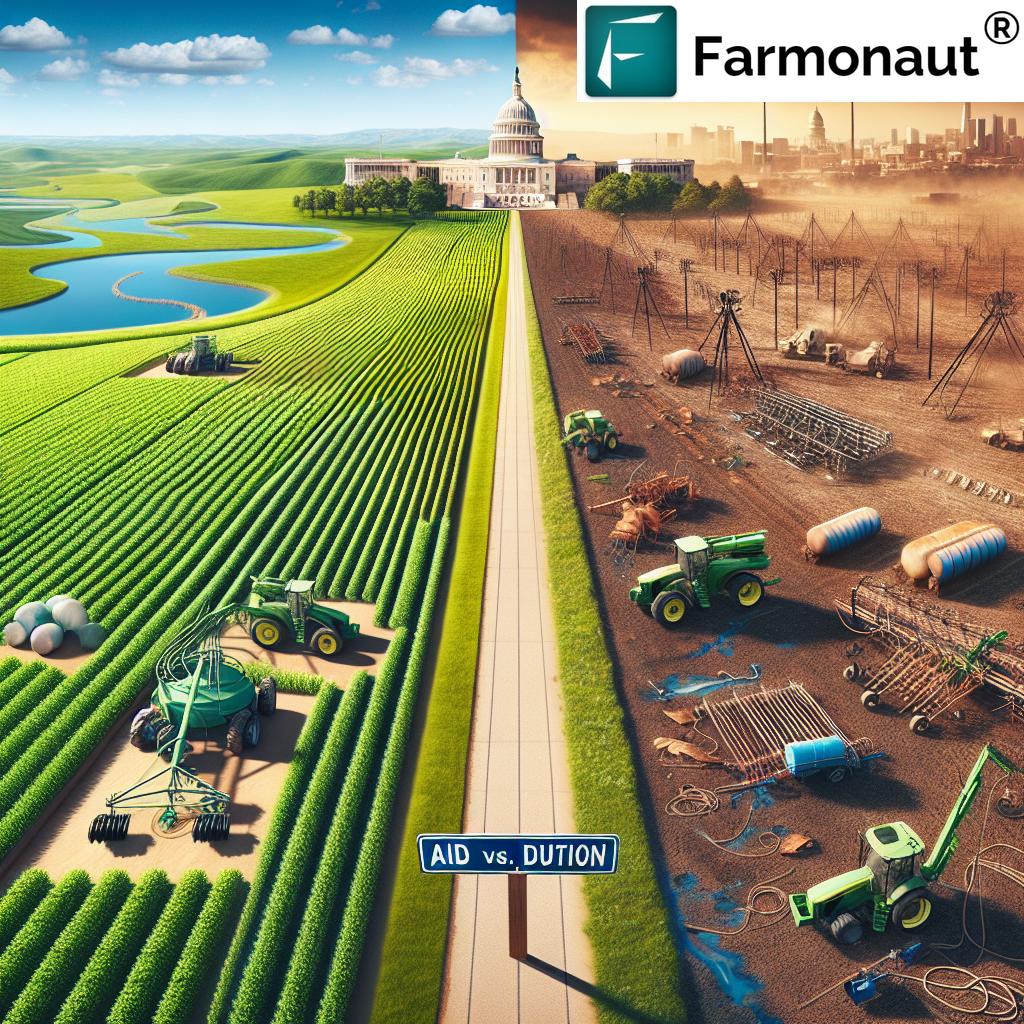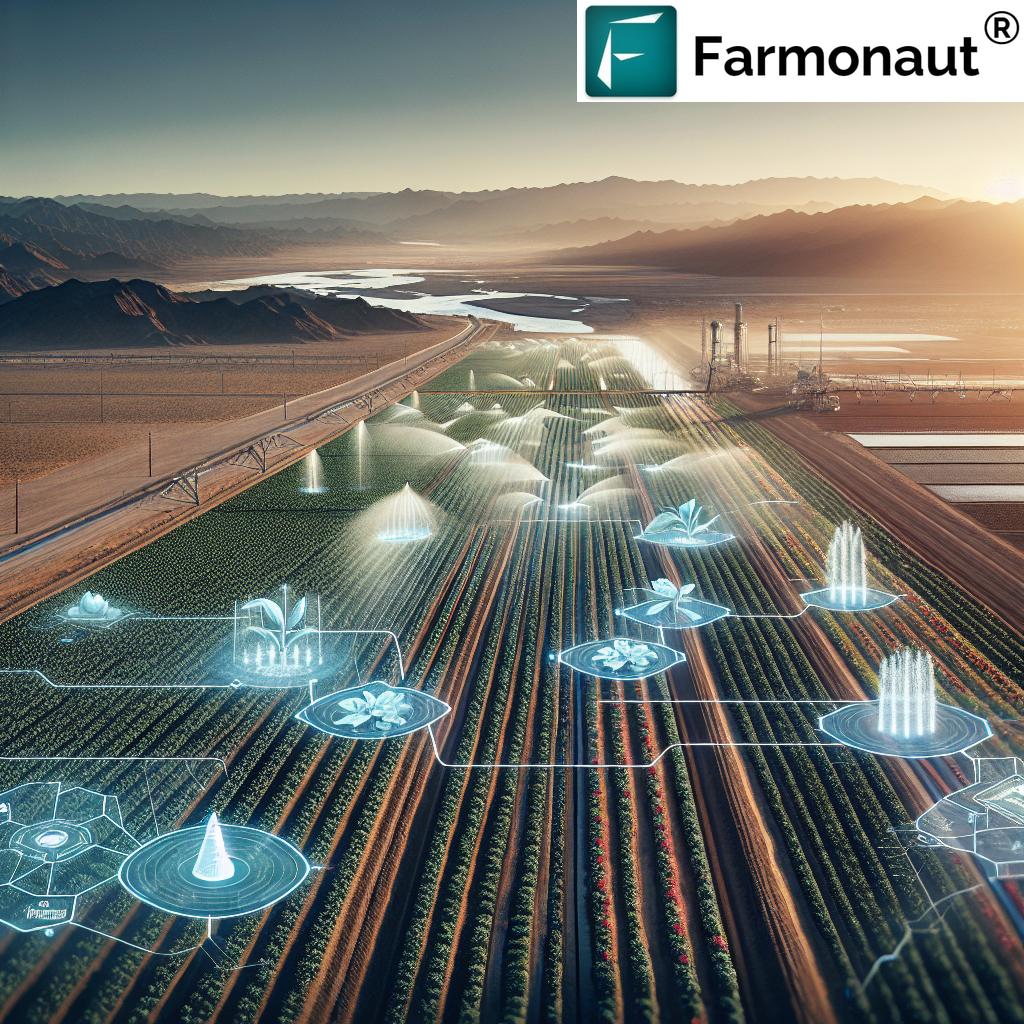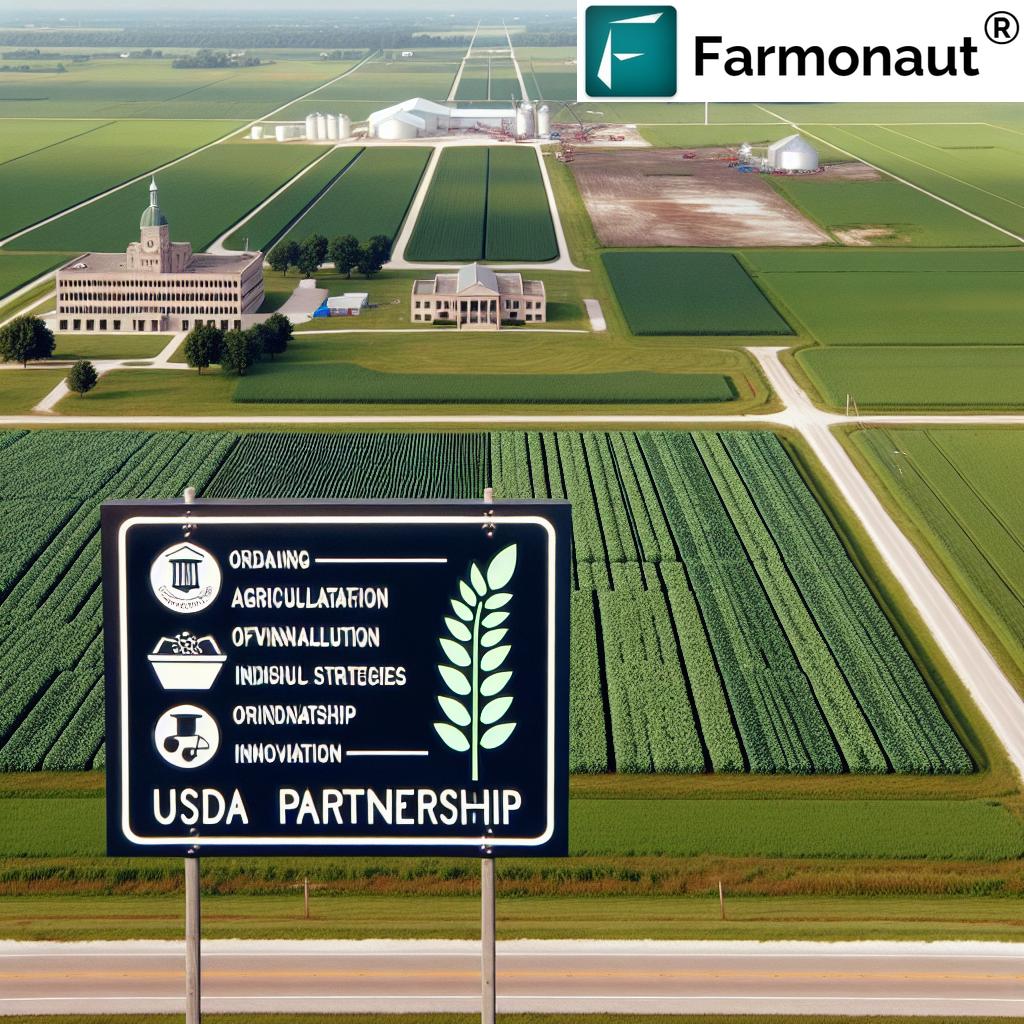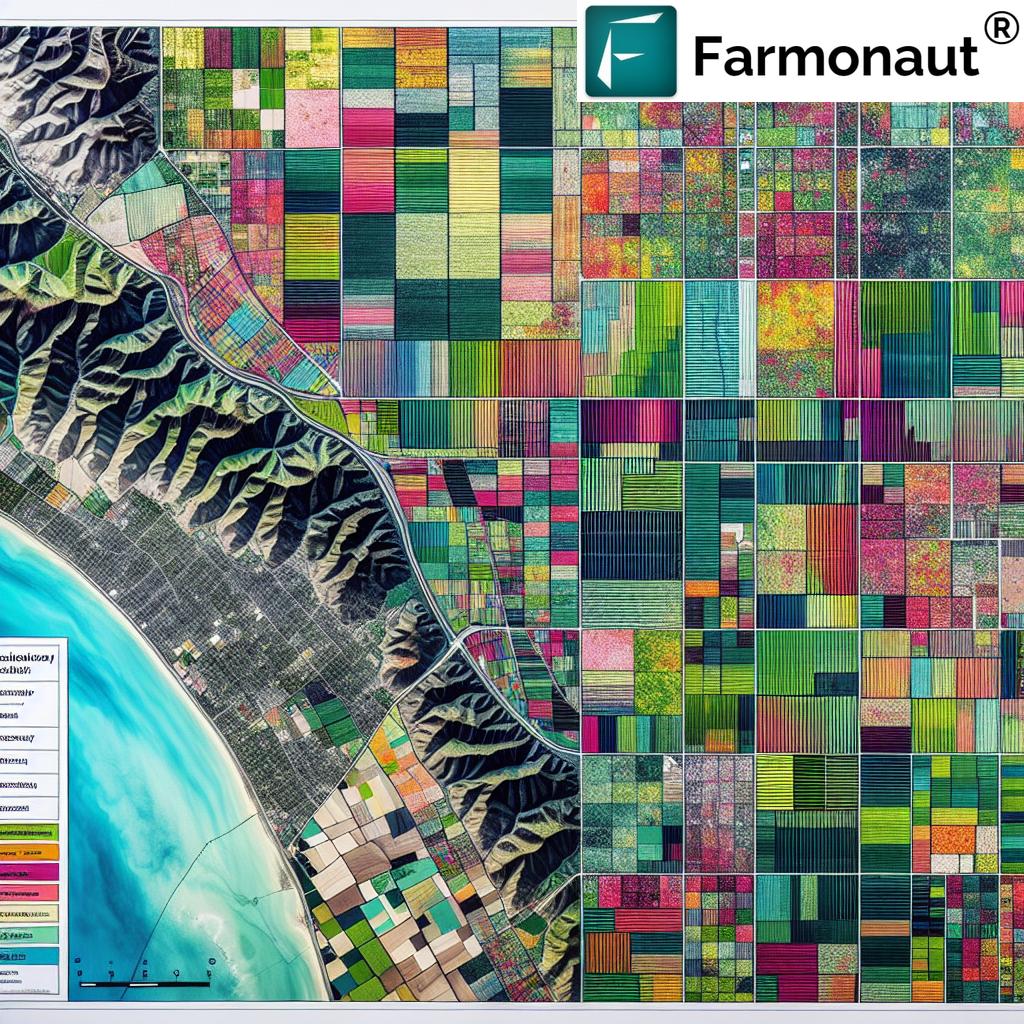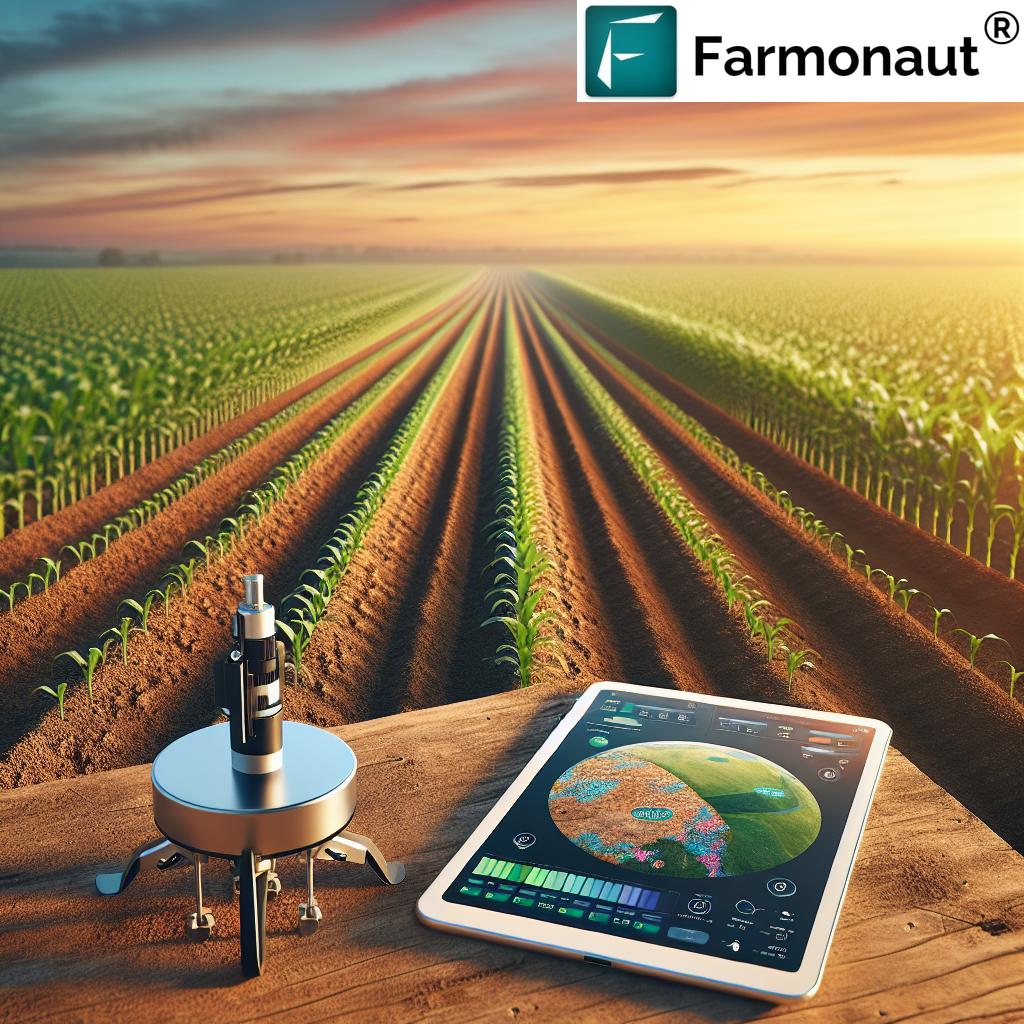Irrigated Farmland for Sale in Tennessee: 2025 Guide
“In Tennessee, irrigated farmland can increase crop yields by up to 30% compared to non-irrigated fields.”
Table of Contents
- Summary: Irrigated Farmland in Tennessee
- Overview of Irrigated Farmland in Tennessee
- Agricultural Benefits and Crop Productivity
- Farmland for Sale in Tennessee: Market Trends 2025
- Key Irrigation Systems & Technologies in 2025
- Sustainability & Forestry: Protecting Natural Resources
- Precision Agriculture & Sustainable Management with Farmonaut
- Estimated Yields and Investment Returns Table
- Video Library: Irrigated Farmland, AI & Sustainability
- Buying Irrigated Farmland: Process, Due Diligence, Resources
- FAQ: Common Questions on Irrigated Farmland in Tennessee (2025)
- Conclusion: Secure Your Agricultural Future
Summary: Irrigated Farmland in Tennessee — A Vital Asset for Sustainable Agriculture in 2025
Tennessee’s rich agricultural heritage continues to thrive and adapt in 2025, significantly supported by the growing presence and strategic use of irrigated farmland across the state. With a diverse climate, fertile soils, and a strategic location central to U.S. distribution channels, Tennessee offers unique opportunities for farmers, investors, and land buyers seeking sustainable, high-yield agricultural ventures.
A well-managed irrigated farmland tennessee parcel does more than just secure consistent crop yields—it enhances risk management, optimizes farm productivity, and stands as a valuable asset in an era marked by climate variability and water resource challenges. As the market for farmland for sale in Tennessee remains robust, irrigated parcels command a premium due to their sustainability and productivity potential.
Overview of Irrigated Farmland in Tennessee
The term irrigated farmland refers to agricultural land supplemented with artificial application of water to enhance plant growth and crop output. While Tennessee’s farmland has traditionally relied on the region’s abundant rainfall, current weather unpredictability and increasing drought concerns have underlined the importance of owning or managing irrigated land in the state.
- Presence: Approximately 2-3 percent of Tennessee’s farmland is currently irrigated, with the majority concentrated in the Western and Central regions (near the Mississippi and Tennessee Rivers), where row crops like corn, soybeans, and cotton are the most prevalent.
- Water Sources: Farms utilize a combination of groundwater (from wells and aquifers) and surface water resources from systems such as the Cumberland and Tennessee Rivers.
- Technological Support: The growth of affordable, advanced irrigation options—drip, center pivot, and soil moisture sensors—has made precision irrigation increasingly feasible for more farms.
The adoption of irrigation systems is a defensive strategy that secures crop output during dry weather, addresses increasingly variable rainfall and enables farmers and investors to maximize land productivity across sustainable, environmentally conscious operations.
Agricultural Benefits and Crop Productivity: How Irrigated Farmland in Tennessee Enhances Yields
Over the last decade, irrigated farmland in Tennessee has proven invaluable for both large and small farmers by supplementing rainfall and enabling consistent, resilient crop production. Here’s how irrigation benefits crop yields, quality, and sustainability:
- Stabilized Yields: By supplementing natural rainfall, irrigated fields better withstand dry spells and variable weather. This stability reduces the risk of crop loss during periods of drought.
- Increased Output: Key row crops like corn, soybeans, and cotton respond dramatically—in some cases, yielding up to 30% more than their non-irrigated counterparts. Specialty produce—tomatoes, cucumbers, berries grown in Tennessee—also demonstrates significant yield and quality improvements.
- Mitigated Risk: Irrigation acts as an insurance policy, shielding entire operations from the whims of unpredictable weather, prolonged droughts, and climate variability.
- Extended Growing Seasons: With controlled water application, vegetable and specialty crop farmers can plant earlier in spring and harvest later in the fall, lengthening the profitable season for high-value crops.
- Sustainable Practices: Tennessee farmers are increasingly adopting precision irrigation methods (drip systems, AI monitoring) to conserve water, reduce input waste, and build long-term soil health.
Farmland for Sale in Tennessee: Market Trends and Opportunities in 2025
As we look toward 2025, the market for farmland for sale in Tennessee—particularly irrigated parcels—remains highly competitive and attractive to both investors and farmers seeking resilient, sustainable operations.
- Increasing Demand: There’s strong interest nationwide in sustainable agriculture, local food production, and climate-adaptive investments.
- Pricing Premium: Irrigated farmland in tennessee commands up to 20–30% higher sale prices compared to non-irrigated parcels, reflecting recognition of its productivity and risk management value.
- Hotspots & Regions: Western Tennessee (proximity to the Mississippi River), Central regions (around the Tennessee River basin), and select Middle Tennessee communities are seeing robust development of new irrigation infrastructure.
- Buyer Profiles: Family farmers, institutional investors, sustainable food brands, and those seeking agricultural diversification are the key audience for these land for sale opportunities.
For those interested in making strategic acquisitions, a focus on existing irrigation infrastructure, quality soil profiles, proven water access and rights, and market proximity is essential.
“Over 40% of Tennessee’s irrigated farmland uses sustainable water management practices to combat climate and resource challenges.”
Key Irrigation Systems & Technologies in Tennessee Farmland, 2025
Modern irrigation infrastructure is transforming how tennessee farmland operates, making sustainable water use not only possible, but profitable. The main systems powering Tennessee agriculture today include:
- Drip Irrigation: Delivers water precisely to crop roots, minimizing evaporation and runoff. Ideal for specialty crops and maximizing water use efficiency.
- Center Pivot Systems: Suited for larger, row-crop operations—these automated, rotating sprinklers offer uniform coverage across major row crops like corn, soybeans, and cotton.
- Soil Moisture Sensors: Monitor real-time soil conditions, allowing farmers to optimize irrigation schedules and conserve valuable water resources.
- AI-Powered Monitoring Tools: Satellite and sensor-based technologies—including tools provided by platforms like Farmonaut—help track vegetation health, detect water stress, automate decisions, and manage resources with precision.
Explore our Large-Scale Farm Management platform for integrated solutions—ideal for tracking fields, optimizing irrigation, and maximizing yields.
The adoption of these advanced irrigation systems helps farms thrive even in the face of increasing climate challenges, droughts, and competition for natural water resources.
Sustainability and Forestry: Protecting Tennessee’s Natural Resources with Irrigated Farmland
Beyond row crops, Tennessee’s forestry sector is starting to integrate irrigation, especially in high-value tree nurseries and managed timber plantations.
Sustainable water management practices are now a priority due to growing environmental concerns and the need to balance agricultural productivity with ecosystem preservation.
- Conservation-Focused Irrigation: More farms are implementing precision moisture delivery systems and monitoring tools to minimize water waste and protect local river basins, soils, and aquifers.
- Compliance with Water Use Regulations: The state of Tennessee sets guidelines on groundwater withdrawals and irrigation practices to prevent depletion of shared resources.
- Forestry Benefits: Nursery trees supplied with consistent moisture grow faster, produce higher-quality timber, and require less chemical intervention.
As the demand for sustainable, traceable agriculture and forestry products grows, technology-enabled management (like carbon footprinting tools or product traceability solutions) is enabling a new era of environmental stewardship.
We recommend landowners and institutional managers explore AI-powered resource management solutions for further reducing their footprint. Discover how our Carbon Footprinting module helps Tennessee’s agribusinesses track, analyze, and minimize their environmental impact while ensuring compliance with new sustainability standards.
Precision Agriculture & Sustainable Management with Farmonaut
As precision agriculture gains momentum across Tennessee, there’s a clear need for affordable, accessible technology solutions that empower farmers to optimize yields, irrigation schedules, and resource allocation. Thus, at Farmonaut, our mission is to make advanced satellite-based farm management tools easily available to farmers, agribusinesses, and land investors.
- Satellite Crop Health Monitoring: Our platform provides real-time, actionable insights into crop health (NDVI), soil moisture levels, and other key metrics to help optimize irrigation timing, fertilizer use, and pest management.
- AI-Based Advisory: With Jeevn AI, we offer custom guidance on irrigation needs, weather alerts, and sustainable practices to help farmers boost productivity and reduce input costs.
- Resource Management & Traceability: Our solutions enable precise fleet and input management while delivering blockchain-based transparency for product supply chains.
Read more about our product traceability platform here, and discover its role in sustainable, transparent agriculture. - Compliance & Environmental Benefits: Our carbon footprint tracking features guide farms and agribusinesses toward sustainable practices in line with emerging regulatory requirements.
Our solutions are available via Android, iOS, and Web App—fully accessible on mobile and browser.



- API Access: Empower large-scale operations or agri-developers to integrate powerful farm data directly:
Farmonaut API |
Developer Docs
For organizations wanting to leverage these technologies across multiple holdings, or for advisors recommending investments in irrigated farmland for sale in Tennessee, our flexible subscription packages deliver scalable, precision-management at your fingertips.
Estimated Yields and Investment Returns: Irrigated vs. Non-Irrigated Farmland in Tennessee (2025)
| Farmland Type | Average Crop Yield (bushels/acre) | Estimated Annual Revenue ($/acre) | Water Usage (gallons/acre/year) | Sustainable Practices Adoption (% of farms) | Average Sale Price ($/acre) |
|---|---|---|---|---|---|
| Irrigated Farmland | 180–220 (corn), 55–65 (soybeans) | $1,750–$2,200 | 18,000–24,000 | 40%+ | $8,000–$10,500 |
| Non-Irrigated Farmland | 135–170 (corn), 40–52 (soybeans) | $1,250–$1,650 | 8,000–10,000 | 20–28% | $6,250–$7,900 |
This comparative analysis shows how irrigated farmland in tennessee consistently outperforms non-irrigated counterparts in both productivity and environmental stewardship. The higher resale value reflects robust market confidence in sustainable, climate-adaptive agricultural practices.
Video Library: Innovations in Irrigated Farmland, AI, & Water Resource Management
- Global Innovations: From solar-powered pumps in Malawi to megaprojects in Peru, see how irrigation is transforming farming worldwide.
- Smart Water Use: Satellite and AI-driven monitoring, leak alerts, and precision tools are the future of sustainable irrigation management.
Buying Irrigated Farmland: Process, Due Diligence, and Resources for 2025
Interested in farmland for sale in Tennessee? Here’s a systematic approach to secure high-value, irrigated parcels:
- Define Your Criteria: Identify the region (Western, Central, or specific river basins), soil profiles, preferred crops (e.g., corn, soybeans, specialty vegetables), acreage, and investment threshold.
- Evaluate Water Resources:
- Check for secure water rights (groundwater wells, surface water permits, river proximity).
- Review existing irrigation infrastructure (drip, center pivot, sub-surface systems).
- Assess Infrastructure & Management Needs:
- Modernization may be needed—our Fleet Management tools help optimize farm machinery and logistics efficiently across new holdings.
- Consider the potential costs and benefits of upgrades or tech adoption.
- Soil & Crop Suitability:
- Conduct comprehensive soil testing to confirm suitability for chosen crops and modern irrigation methods.
- Use services such as our Crop Plantation & Forest Advisory app for ongoing decision support.
- Check for Compliance and Incentives:
- Consult local extension offices for state-specific regulations and possible incentives for sustainable irrigation.
- Connect with Reliable Marketplaces and Agents:
- Utilize respected agricultural real estate platforms and licensed brokers highly familiar with the Tennessee land market.
- Beware of over-inflated prices on parcels lacking true water access or infrastructure.
Choosing irrigated farmland in Tennessee is more than a purchase—it’s a strategic investment in sustainable, profitable agriculture and the resilience of local food systems.
Additional Resource: For farmers seeking enhanced access to credit or crop insurance, learn how our satellite-based crop loan & insurance verification tool can make financing easier and more secure.
When ready, use our Web, Android, or iOS app to monitor your new land and manage operations more sustainably.



FAQ: Common Questions on Irrigated Farmland in Tennessee (2025)
1. What is the primary advantage of buying irrigated farmland in Tennessee?
The biggest advantage is yield stability and risk mitigation. Irrigated farmland ensures steady, higher productivity even during dry spells or unpredictable weather patterns, offering both a sustainable agriculture investment and consistent income for farmers.
2. How much more valuable is irrigated land compared to non-irrigated parcels?
In 2025, irrigated farmland in Tennessee is estimated to sell at a 20–30% premium due to its higher yield potential, reliable water access, and resilience against climate variability.
3. What should I consider before purchasing irrigated farmland for sale in Tennessee?
- Reliable access to water (groundwater or surface water rights)
- Quality of existing irrigation infrastructure
- Soil fertility and suitability for intended crops
- Location and proximity to markets and transportation
- Compliance with state water regulations
- Potential for modernization or tech adoption
4. Which crops benefit most from irrigation in Tennessee?
Major row crops such as corn, soybeans, and cotton, as well as vegetables (tomatoes, cucumbers) and berries, all benefit significantly—showing increases in yield quantity and quality.
5. How does Farmonaut support buyers and farmers with irrigated land?
We provide satellite-based crop monitoring, real-time soil moisture mapping, AI-driven irrigation and management advisories, as well as resource optimization tools accessible on any device. Our platform empowers both individual farmers and large operations to maximize their sustainable farming success.
6. What sustainable practices are encouraged with irrigated farmland?
The adoption of drip systems, regulated deficit irrigation, soil moisture sensor-driven schedules, AI-powered drought alerts, and traceability solutions all form part of the recommended sustainable approach. Over 40% of irrigated farmland in Tennessee already uses such practices in 2025.
7. Are there financial or environmental incentives for sustainable irrigation?
Various state and federal programs encourage upgrades to sustainable, efficient irrigation in Tennessee, alongside premium market opportunities for crops produced with advanced environmental stewardship. Check with local extension offices for specifics on grants or cost-share programs.
Conclusion: Secure Your Agricultural Future with Irrigated Farmland in Tennessee (2025 and Beyond)
As we approach the midpoint of the decade, irrigated farmland in Tennessee stands out as a vital asset for the region’s future. Its ability to mitigate climate risk, stabilize yields, enable sustainable management practices, and generate strong investment returns makes it a foundational element for farmers, agricultural enterprises, and environmentally conscious investors alike.
With the continued support of technological innovation, precision analytics, and data-driven advisories (now accessible to all via platforms like Farmonaut), Tennessee’s farmland market remains robust. Whether buying, managing, or upgrading irrigated land, there has never been a better time to invest in the future of sustainable agriculture across the state.
Start your journey today:



If you are looking to make a durable, environmentally responsible investment—or simply wish to adapt your farming to new climate conditions—look no further than the current opportunities available in irrigated farmland for sale in Tennessee.


